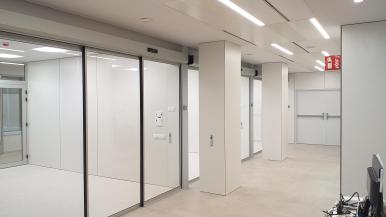

The Pandemic Boosts Automated Access in Hospitals
The pandemic situation has made public and private healthcare operators aware of the need to adapt, re-equip and modernise their facilities. One of the most notable changes in hospitals has been the growth in contracts for installing new automatic access points.
Iván Idiáquez is Sales & Services Manager at Erreka. He explains that the Coronavirus situation has led to an increase in hospitals contracting to install new automatic access points. “Although many projects have had to be carried out in an emergency situation with little planning, it seems clear that this new awareness can boost business in the sector and further extend the use of automatic doors in all kinds of health centres.”
José M. Rodríguez, Sales Manager at Aprimatic, also highlights that “Covid-19 has forced the implementation of numerous health and safety measures, especially by hospitals, to reduce virus infection risk as far as possible by avoiding touching. For example, “operating room doors must be installed very well to keep these clinical spaces clean and sterile,” and installers must take into account that “pathogens move in and out through hospital doors, so it’s essential to neutralise them.”
Advantages of Automatic Doors
In the opinion of Iván Idiáquez, of Erreka, the advantages of automatic doors are clear: “In the current situation, obviously, it’s critical to improve safety to prevent transmission of any new viruses by sectorising premises much better. New door technologies for touchless opening are already well established and widespread, for sliding or hinged doors, hermetic, semi-hermetic, lead-lined doors for X‑ray rooms, for example.”
In the short term, we’ll see significant advances in the sector enabled by new connectivity and IoT technologies “to create smarter spaces and allow big improvements in internal mobility within buildings, and monitoring for security and data exploitation.”
Idiáquez foresees that “the sector’s leading manufacturers are already working on the development of different applications to integrate these new technologies, focusing both on improving the experience for users, that is for patients, and to improve management and operating efficiency for public or private operators.”
Touchless Devices
José M.Rodríguez of Aprimatic points out that the new access technologies “reduce the need for contact when opening or closing by using touchless devices, using automatic sliding or swing doors.” Also, “automatic swing doors in hospitals can have an arm above to control the leaf’s opening and closing speed, and even an anti-finger pinch system, to prevent the door closing if someone has accidentally put their fingers in the hinges.”
Rodriguez says that this type of door “is currently the safest option for operating rooms and clean rooms, and for any hospital that has pedestrian doors between different areas or zones.”
And he reiterates that “hospital doors must comply with a series of requirements to ensure that the environmental and health parameters in these areas are strictly controlled.” Compliance with these regulations is mandatory to “ensure that spaces for surgical interventions and special medical treatments comply with the safety measures required by both Spain and the European Union.”





